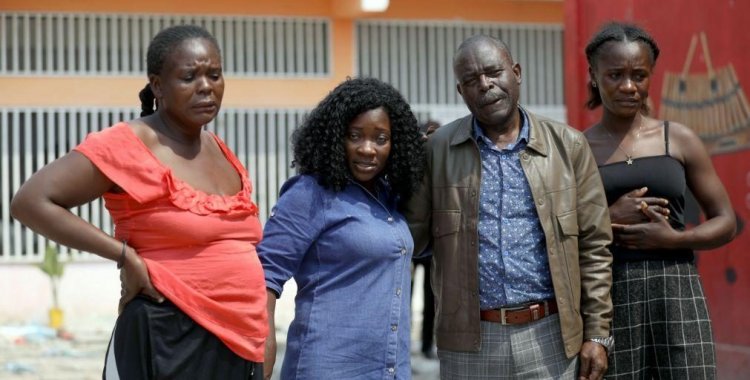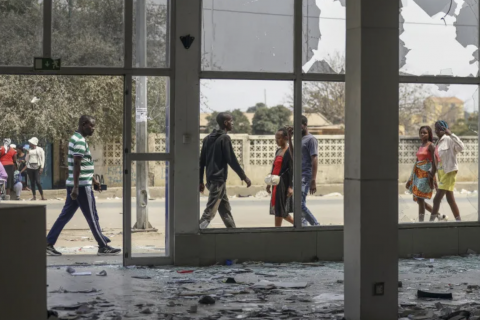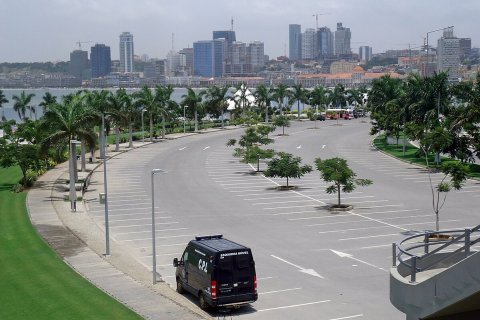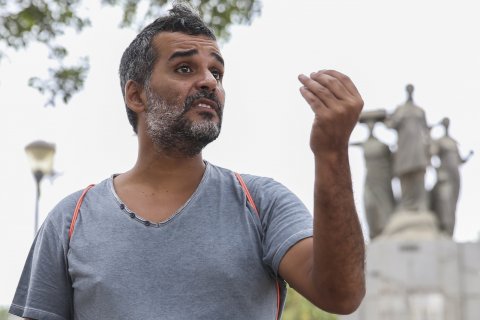What remains of the building bears the signs of the care and affection with which the space was managed, which included bars, a hostel, a restaurant, a party room, and a small shop, in the Calemba 2 neighborhood – one of the areas most affected by the violence that swept through several parts of the capital on the first day of the taxi drivers' strike.
The rise in fuel prices was the catalyst for the strike, but it quickly gave way to the pent-up frustration and anger of Luanda residents suffering from poor socioeconomic conditions. The protests turned into vandalism and looting.
Since Monday, when the strike began, at least 22 people have lost their lives in the unrest, and many others, like António da Costa Bumba, now face uncertainty about their future. Through tears, he told Lusa how he saw a 20-year-old dream crumble.
Born into a poor family, he faced hardships from a young age and, with effort and sacrifice, built a business that "today is a ruin."
"It hurts to explain everything I had, because it's the investment of a lifetime. I have children studying, I have grandchildren, and with this effort I've employed 19 people, some of whom I've worked with for about 12 years," he recounts.
António recalls that his efforts extend to his employees — who "weep with me today" —, women who were present at the time of the uncontrolled mob attack on Monday.
Felícia dos Santos, manager of the store since 2014, describes the hours of panic experienced that day: "On Monday, we came to work, there was a commotion, they started vandalizing some stores, so I fired some guests who went home to their families because it was too much, there was a lot of fighting, a lot of rocks," she told Lusa.
"Our security guards fought, fired several shots, but unfortunately, we ran out of bullets and there was no way to save ourselves. We started jumping from the first floor onto our neighbors' roofs, and we started pulling some guests out to save their lives," she recalls.
The locals, she continues, arrived armed with rocks, machetes, axes, saws, sabers, and mallets.
"They came in here, ransacked the house, took possessions, entered the bedrooms, stole toilets (...) I found the drawer in my living room open, I was in shock, the only solution was to save us. We couldn't do anything, they threatened us, and I watched from afar, in tears," she recounts.
Among the employees, who were absent at the time of the attack, António was alerted by phone.
"I arrived here and right now I'm in tears, I'm devastated, not knowing what to do with my life," says the owner, before breaking down.
He recalled the difficulties he faced before getting the business off the ground, including a power outage — which forced him to operate with generators — until, last year, he finally managed to acquire a processing plant.
With the help of informal loans (he couldn't get bank credit), he invested in improvements: painting, renovating the facilities, installing new air conditioning, and 12 rooms equipped with furniture, a minibar, a television, and air conditioning.
"I finally managed to pay off these debts, and even some employees encouraged me to continue, and thank God, this year I was starting to see the project become profitable. This was built in parts, I spent over a million dollars on this house, my whole life has been dedicated to this house," he says emotionally.
"Right now, I can't find my footing. I'm the son of peasant parents, a suffering child, my whole life and the lives of my friends have been sacrificed, I've never enjoyed a state asset. Now I don't know what to do. At this time, my house, my family, my employees are dying," he despairs.
António filed a complaint with the police and hopes the government will pay attention to the victims of the destruction, but says he has no hope of recovering what he lost:
"I have no recourse. Even if it were a loan, I would be ready, but without that, I have nowhere to start. They stole everything. I appeal to people of good faith, to the Angolan government: parents are crying, children are crying, children are homeless, people are unemployed, people I tried so hard to help, and right now I have nothing. I don't know what I'm going to do with my life; it's completely destroyed. Look at everything I've lost," he says, weeping inconsolably, accompanied by the employees of his "suffering team."
Tomorrow "is a disaster," concludes Felícia dos Santos. "We are unemployed, with nothing, we need help," she says.
Neighborhood, other shops and warehouses show signs of the devastation. Nothing remains. On the asphalt, burned trash and debris create a scene reminiscent of a war zone.
This Wednesday, the situation is more under control, but police rapid response units remain on the streets to prevent further disturbances. Gunshots are still being heard as officers enter neighborhoods and round up suspects involved in the vandalism — adding to the more than 1200 arrested so far.







